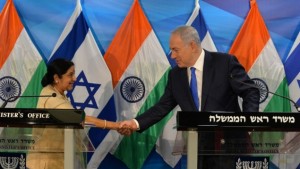TEL AVIV/NEW DELHI: India has unveiled “a new vision” for forging an innovation-focused partnership with Israel, and sought Tel Aviv’s support in key programmes of national renewal, including Make in India, Digital India, Smart Cities and Clean Ganga.
Asking Israel to look beyond trade for building long-term economic stakes in the Indian economy, India’s External Affairs Minister Sushma Swaraj underlined that economic relationship is the key to developing stronger ties between the two countries.
Transforming economic ties
Addressing the Jewish community in Tel Aviv on January 18, the minister underscored the need for transforming “a trade-based relationship to one that is based on investment, manufacturing and services.”
“We encourage you to look beyond trade to build long term stakes in the Indian economy through investment and joint development of products and services,” said Swaraj, who concluded her two-day visit to Palestine and Israel.
Make in India & Smart Cities
Seeking a more proactive involvement of Israel in development initiatives of the Modi government, Ms Swaraj said: “As you know Make in India is a priority of our Government. Our flagship schemes of ‘Clean Ganga’, ‘Smart Cities’ or ‘Digital India’ are all areas of Israeli expertise.”
“I look at the future with optimism and to quote your Prime Minister ‘sky is the limit’ for ties between India and Israel,” said she.
Outlining the future trajectory of India-Israel relations, Ms Swaraj said India and Israel are expanding cooperation to new areas such as homeland security, innovation, education and science and technology. There are around 80,000 Jews of Indian origin in Israel, most of whom are now Israeli passport holders.
Innovation-driven partnership
Swaraj held wide-ranging talks with Israel’s Prime Minister Benjamin Netanyahu which culminated in an overarching plan to step up India-Israel relations across the spectrum. The focus was on transforming bilateral relations, which have remained heavily defence-centric, to a broad-based partnership fueled by innovation and increased trade and investment. The discussions in Tel Aviv have set the stage for a substantive visit by Prime Minister Narendra Modi to Israel, which will make him the first Indian prime minister to visit the Jewish state.
Focusing on key areas of cooperation, Mr Netanyahu spoke about Tel Aviv’s intent to expand cooperation in areas of science and technology, cyber, defence and agriculture. Innovation, the Israeli leader indicated, will remain the driving force of this new phase of India-Israel relations. “The future belongs to those who innovate. Israel and India are at the cutting edge of so many areas of innovation,” said the Israeli leader.
India and Israel have been collaborating on agriculture and water management. With many Indian states facing water scarcity, Israel has agreed to collaborate with the Indian private sector in this area. “Israel is also in close contact with India’s water resources and Ganga rejuvenation ministry,” Israel’s Ambassador to India Daniel Carmon had said ahead of Swaraj’s visit.
Defence and counter-terror cooperation
Looking ahead, the two countries will be looking to give more traction to their defence partnership through Make in India joint-production ventures, transfer of technologies and joint research and development. Israel has emerged as the third largest supplier of military hardware to India. India is Israel’s largest buyer of weapons and India is also exploring joint manufacturing opportunities with Israel under the ‘Make in India’ initiative.
Against the backdrop of the rise of the Islamic State and festering chaos in West Asia, the two sides discussed ways to step up counter-terror cooperation through enhanced intelligence-training, training and bolstering of counter-terror infrastructure.
Mrs Swaraj’s visit to Israel came barely three months after President Pranab Mukherjee’s trip to the Jewish nation in October 2015. During Mr Mukherjee’s visit, the two sides signed a clutch of pacts to in areas of education, science and technology and research and development.
People-to-People contacts
Highlighting the need for closer cultural cooperation, Mrs Swaraj said, “We need many more exchanges between our civil societies, parliamentarians, opinion makers and women. Our students should collaborate in scientific research. Our entrepreneurs should build start-ups together.”
Praising the role of the Jewish community, Mrs Swaraj said: “They are hardworking, sincere and community-minded. They are the most preferred expatriate community in the Gulf region. The Indian Jewish community in Israel is no different and it always pleases me to see how well they have done here.”
Author Profile
- India Writes Network (www.indiawrites.org) is an emerging think tank and a media-publishing company focused on international affairs & the India Story. Centre for Global India Insights is the research arm of India Writes Network. To subscribe to India and the World, write to editor@indiawrites.org. A venture of TGII Media Private Limited, a leading media, publishing and consultancy company, IWN has carved a niche for balanced and exhaustive reporting and analysis of international affairs. Eminent personalities, politicians, diplomats, authors, strategy gurus and news-makers have contributed to India Writes Network, as also “India and the World,” a magazine focused on global affairs.
Latest entries
 DiplomacyJanuary 5, 2026India walks diplomatic tightrope over US operation in Venezuela
DiplomacyJanuary 5, 2026India walks diplomatic tightrope over US operation in Venezuela India and the WorldNovember 26, 2025G20@20: Africa’s Moment – The Once and Future World Order
India and the WorldNovember 26, 2025G20@20: Africa’s Moment – The Once and Future World Order DiplomacyOctober 4, 2025UNGA Resolution 2758 Must Not Be Distorted, One-China Principle Brooks No Challenge
DiplomacyOctober 4, 2025UNGA Resolution 2758 Must Not Be Distorted, One-China Principle Brooks No Challenge India and the WorldJuly 26, 2025MPs, diplomats laud Operation Sindoor, call for national unity to combat Pakistan-sponsored terror
India and the WorldJuly 26, 2025MPs, diplomats laud Operation Sindoor, call for national unity to combat Pakistan-sponsored terror








